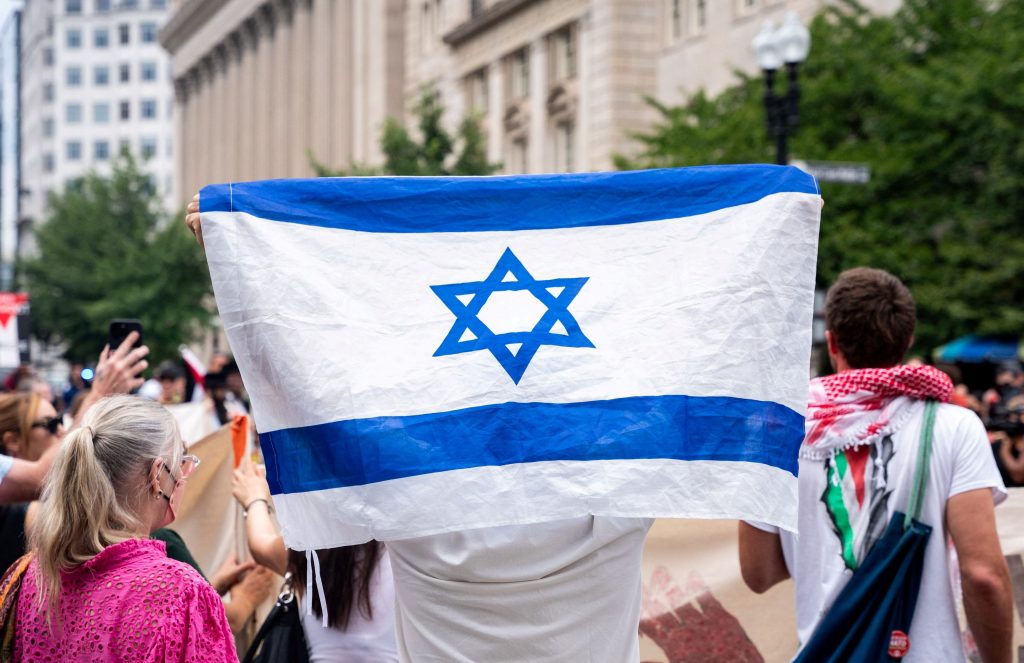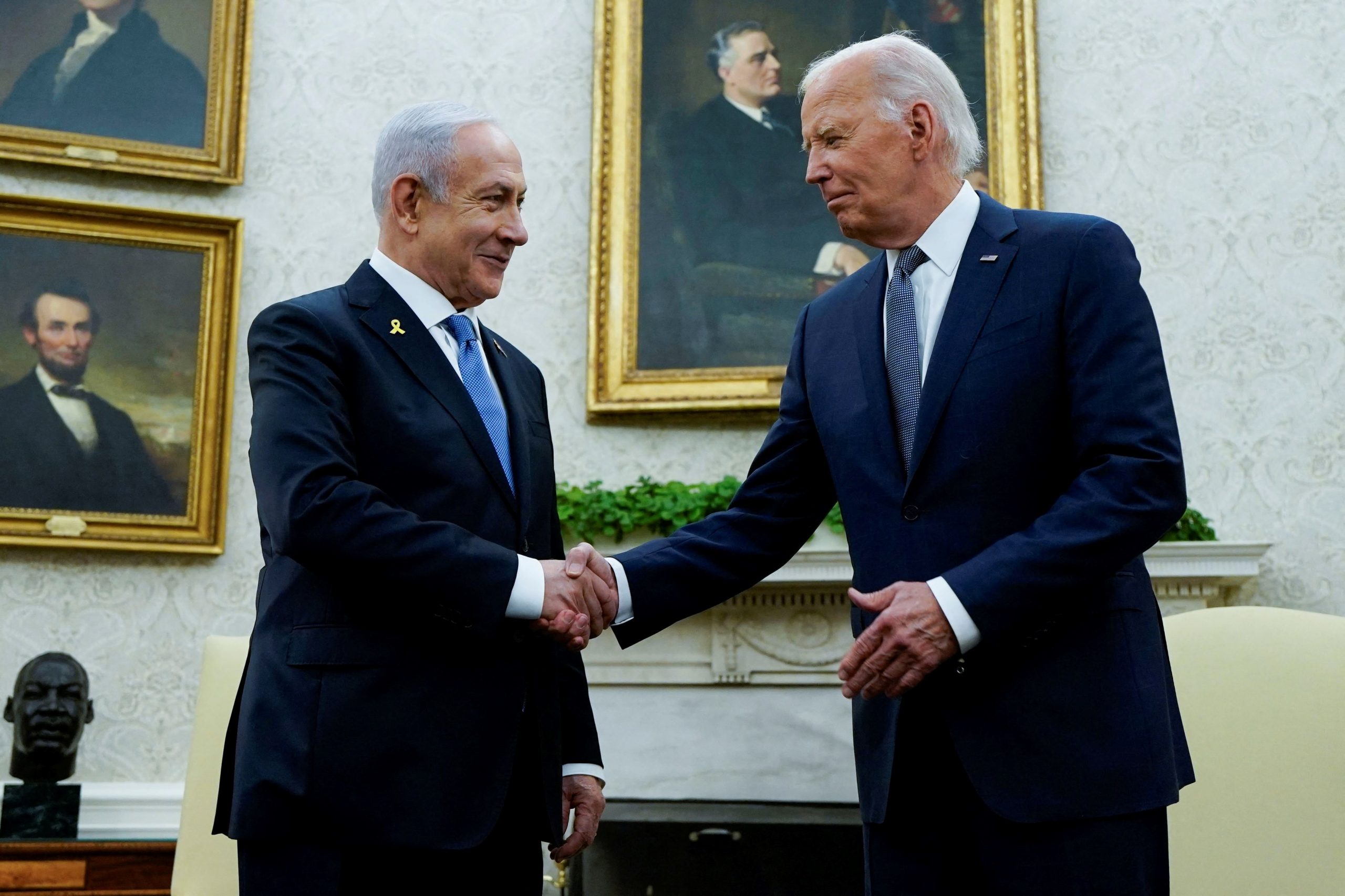President Biden met with Israeli Prime Minister Benjamin Netanyahu at the White House on Thursday, aiming to close the remaining gaps in a Gaza cease-fire deal after months of fruitless negotiations.
The Biden administration believes the gap between Israel and Hamas is narrow enough to be closed if those issues can be worked out, a senior administration official said. “It’s time to move to close that agreement,” the official told reporters Wednesday.
Optimism had built recently about a deal to pause the fighting in Gaza after Hamas showed flexibility on some contested language and Israeli security officials said the time is right to reach an agreement that would bring home some of the Oct. 7 hostages still held in the Palestinian enclave.
The mood darkened as negotiations bogged down in debates over new demands that Israeli security officials and Arab negotiators say Netanyahu has raised late in the process.
Arab negotiators say a number of issues remain in contention, including the number of live hostages to be released, control of the border between Gaza and Egypt, whether Israel will have a veto over which Palestinian prisoners can be released under the deal, and whether Israel will be able to resume fighting after the initial cease-fire.
“There are some very serious implementation issues that still have to be resolved,” the U.S. official said Wednesday.
Hamas has been “very dug in” on its demand for a permanent cease-fire and full withdrawal of Israeli forces before a release of some hostages, the U.S. official said. But negotiators have now worked out details of how a hostage release would work.
While the U.S. official said the administration didn’t expect to clinch a deal during the Thursday White House meeting—the first time the two leaders have met in person since Biden’s trip to Israel after the Oct. 7 attacks—they planned to focus on closing the remaining gaps in the negotiations.

A pro-Israel demonstrator holds an Israeli flag near a pro-Palestinian rally on the day Israeli Prime Minister Benjamin Netanyahu is scheduled to hold White House meetings with U.S. President Joe Biden and Vice President Kamala Harris, at Lafayette Park in Washington D.C., U.S., July 25, 2024. REUTERS/Seth Herald
“We are close,” National Security Council spokesman John Kirby told reporters at the White House on Thursday, while the two leaders were meeting. “We just have to finish it.”
Vice President Kamala Harris is expected to meet with Netanyahu separately Thursday afternoon.
Netanyahu plans to meet with Donald Trump on Friday at the former president’s Mar-a-Lago resort in Palm Beach, Fla. In an interview Thursday morning with Fox News, Trump didn’t address the cease-fire negotiations but said the protracted war in Gaza was bad for Israel’s public relations.
“I want him to finish up and get it done quickly,” Trump said of Netanyahu. “You’ve got to get it done quickly because they are getting decimated with this publicity.”
Members of Israel’s security establishment, representatives of the families of Israeli hostages and Arab negotiators involved in the talks are less optimistic. While they say the time is right for a deal to halt the fighting, they believe Netanyahu is stalling progress for domestic political reasons.
The prime minister’s narrow governing coalition depends on far-right parties whose leaders have threatened to leave if the government cuts a deal that stops the fighting. Netanyahu has said keeping up the military pressure is the best way to reach a deal that gets the hostages back.
The Hostage Family Forum, which represents most of the families of hostages in Gaza, strongly criticized Netanyahu for not mentioning negotiations to free their captive relatives during his speech in Congress Wednesday and on Thursday demanded an emergency meeting with the Israeli negotiating team.
“He has left Israel at this critical moment in the negotiations for political posturing, and he must, at the very least, allow the negotiations to continue and finish the agreement,” said Lee Siegel, brother of Israeli-American hostage Keith Siegel.
Israel invaded Gaza after the Hamas-led attacks on Oct. 7 that left 1,200 dead and around 250 taken hostage. Israel’s subsequent military operations in Gaza have killed more than 39,000 people in the enclave, Palestinian health authorities say, who don’t say how many were combatants.

A woman holds her hands up stained with fake blood, as demonstrators gather during a pro-Palestinian rally on the day Israeli Prime Minister Benjamin Netanyahu is scheduled to hold White House meetings with U.S. President Joe Biden and Vice President Kamala Harris, at Lafayette Square Park in Washington, D.C., U.S., July 25, 2024. REUTERS/ Umit Bektas
Israel’s military feels it has accomplished its goals in Gaza and wants to turn its attention to the country’s northern border and the daily exchanges of fire with the Lebanese militant group Hezbollah. The shooting has emptied out a swath of land on both sides of the border, and Israel’s government is under heavy pressure to return people to their homes and reverse what it sees as a loss of sovereignty.
A cease-fire would allow troops to rest and redeploy, and would create an opening for negotiations to resolve the issue on the Lebanese border. Hezbollah has said it would continue fighting until the war in Gaza ends.
Israel’s parliament, the Knesset, will go into recess next week until Oct. 27, giving Netanyahu a window in which he can try to advance the deal without fear his government could be toppled.
That time period would be long enough for at least the first phase of the deal, which would see the fighting stop for six weeks and Israel redeploy its troops out of populated areas in Gaza, in exchange for the release of some of the hostages.
Netanyahu is focusing on keeping the possibility open of restarting the war once the first phase of the deal is over, a move that he says is necessary for a total defeat of Hamas and which could also satisfy his far-right allies.
Biden and Netanyahu were also expected to discuss threats from Iran and proxy groups, including Hezbollah and the Houthis as well as Hamas, the official said, as well as bringing together regional partners to defend Israel as they did in April against an Iranian missile threat.
The U.S. administration has been optimistic about the prospects of a cease-fire in recent days.
“I believe we’re inside the 10-yard line and driving toward the goal line in getting an agreement that would produce a cease-fire, get the hostages home, and put us on a better track to trying to build lasting peace and stability,” Secretary of State Antony Blinken said last week at the Aspen Security Forum.
Dov Lieber and Anat Peled contributed to this article.



